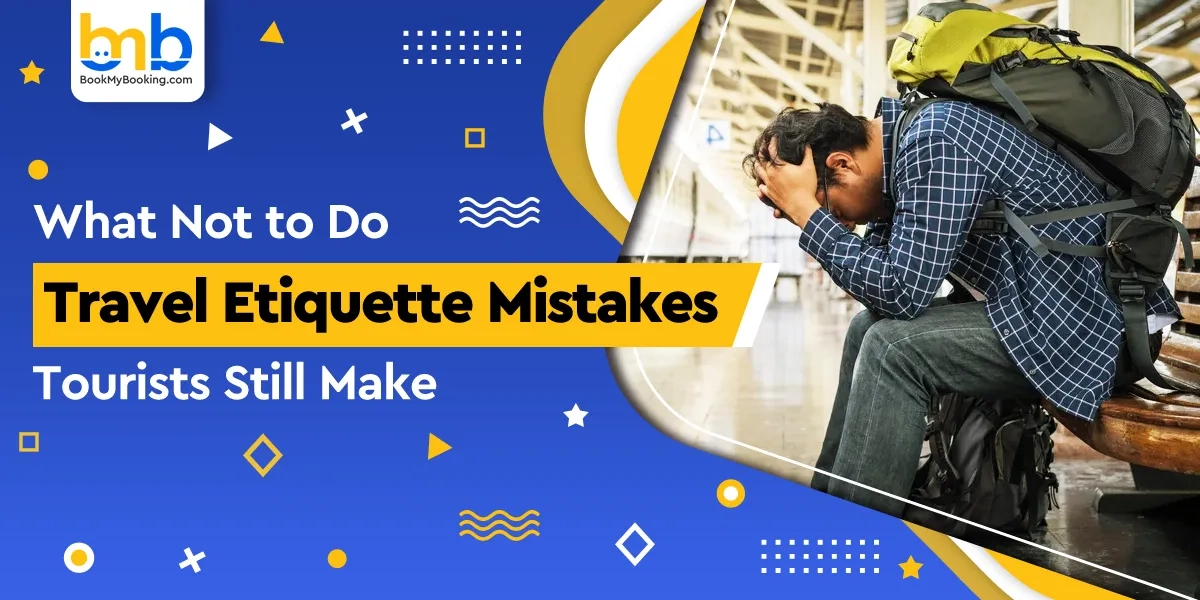Travel is one of the most enriching experiences a person can have. It exposes you to new cultures, ways of life, and people. But too often, in the excitement of ticking off bucket-list destinations, travellers forget one crucial part of the journey- respect. As global citizens, booking a flight, snapping a selfie, and grabbing souvenirs is no longer enough. If you want your travels to be meaningful (and not cause offence), you must pack respect and perspective along with your passport. Ignoring these can lead to embarrassing or even offensive situations.
Let's explore the most common tourist mistakes, the "don'ts" that can unknowingly turn a great vacation into a cultural misstep.
1. Ignoring Local Customs and Dress Codes

Travel can make us forget we aren't at home, leading to one of the most glaring common travel mistakes: disregarding local customs. Whether it's wearing shorts in a temple or sandals to a formal gathering, this oversight often offends. Imagine arriving at a place of worship where modest attire is expected; you risk appearing disrespectful or ignorant. Do your homework: for instance, in many Middle Eastern and Asian countries, covering shoulders and knees is mandatory. Carry a travel scarf or shawl in your day bag as it’s easy to use and more respectful. Locals notice that when you make just a slight wardrobe adjustment, it shows cultural awareness and humility. This simple act transforms you from a potential headline about bad tourist behaviour into someone practising genuine, respectful travel tips. So next time you pack, include not just clothes, but cultural insight.
2. Taking Photos Without Permission
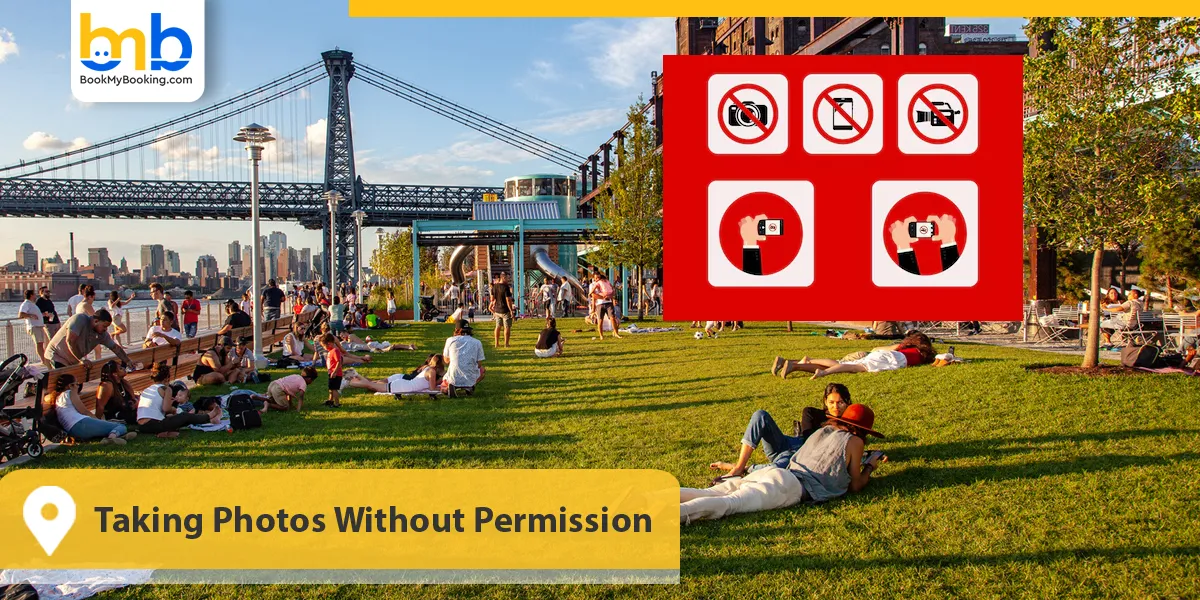
It's tempting to snap breathtaking photos, but one of the top tourist mistakes is shooting without consent. You might think capturing every moment is harmless, yet in many societies, taking someone's photo without asking feels invasive or unethical. Think rural villagers, temple worshippers, or people in vulnerable situations. Always seek permission, even a simple "May I?" goes a long way. Be prepared to show your camera's screen so they can see that you're respectful. Pushing ahead after a refusal? That's classic travel faux pas around the world. Instead, share a smile, engage briefly, and ask. This small moment of human connection often leads to richer storytelling than any photo. You'll notice people will be warmer when you ask kindly. It's the epitome of cultural etiquette for travellers, and a gesture that pays off in trust and unforgettable memories.
3. Assuming Everyone Speaks English

Thinking everyone understands English is one of those things not to do while travelling that reveals ignorance, especially when a polite phrase here and there would ease interaction. It's about both language and empathy. Learn a few greetings and courtesies in the local language: konnichiwa, gracias, namaste. These phrases show effort and respect. Even if your pronunciation isn't perfect, your goodwill shines through. Pull out your phone translator app in markets or taxis, show the text, and remain patient. Don't raise your voice or become frustrated; it won't help and only highlights cultural insensitivity. These small efforts stop you from becoming a bad tourist behaviour and help you practice essential international travel tips. You'll be surprised: locals often go out of their way to help a traveller who tries even if they don't understand every word.
4. Over-Tipping or Under-Tipping

Tipping: it's a rabbit hole of regional nuance. In the U.S., skipping a tip can be perceived as insulting, yet it's considered inappropriate or even offensive in countries like Japan or South Korea. Making tipping mistakes without research is among the top travel mistakes to avoid. Don't assume customary percentages travel worldwide. Instead, read before you board the plane. Apps like TripAdvisor or local tourism boards specify tipping norms, such as rounding up in markets, a 10% tip in motels, or no tip at all. Keep small bills handy. Don't gesture if your tip embarrasses or humiliates the receiver. In some places, a polite bow replaces money. Accepting or refusing transfers gracefully shows respectful travel behaviour. When in doubt, ask a local or hotel concierge. Paying attention to this aspect of service etiquette tells locals you appreciate their work, without overstepping. It's a small but powerful etiquette rule for travellers.
5. Treating Cultural Experiences Like Theme Parks

Treating ceremonies or rituals like photo ops, you're committing a classic travel faux pas worldwide. These cultural moments aren't performances—they're sacred, lived experiences. Think of a tribal blessing or Buddhist chanting—if you clap, comment, or selfie-boast, you risk trivialising someone's living tradition. Instead, observe respectfully: stand still, lower your voice, follow local cues—maybe you'll even be invited to participate. Ask beforehand. Take time to listen to guides or insiders who can explain significance. Recognise that traditions have meanings deeper than tourism. Engage in quiet reflection, ask thoughtful questions, and avoid turning these moments into background noise for your feed. Doing so shows genuine, respectful travel tips in action. You'll leave with more than just photo files—you'll leave with a deeper understanding. This mindful approach highlights the difference between a casual observer and someone practising cultural etiquette for travellers.
6. Being Loud and Disruptive

Volume matters. Really. In many public spaces from Swiss trains to Japanese temples to European cafés, quiet etiquette is the unspoken rule. Speaking loudly, making loud calls, or playing music through your phone can be considered bad tourist behaviour. People expect a peaceful environment. Keep your voice down, especially in enclosed or sacred spaces. If you must make a call, please step outside or use the designated phone zones. The same applies to laughter: enjoy it, but gauge the surroundings first. If you sense local shame or irritation, tone it down. This attentiveness reflects one of the strongest signals of travel etiquette. You may notice locals glancing appreciatively when you check your volume or politely ask to lower your tone. That buzz of mutual respect? Priceless. It's simple: control your voice, and you're already doing more than most travellers.
7. Disrespecting Sacred Sites
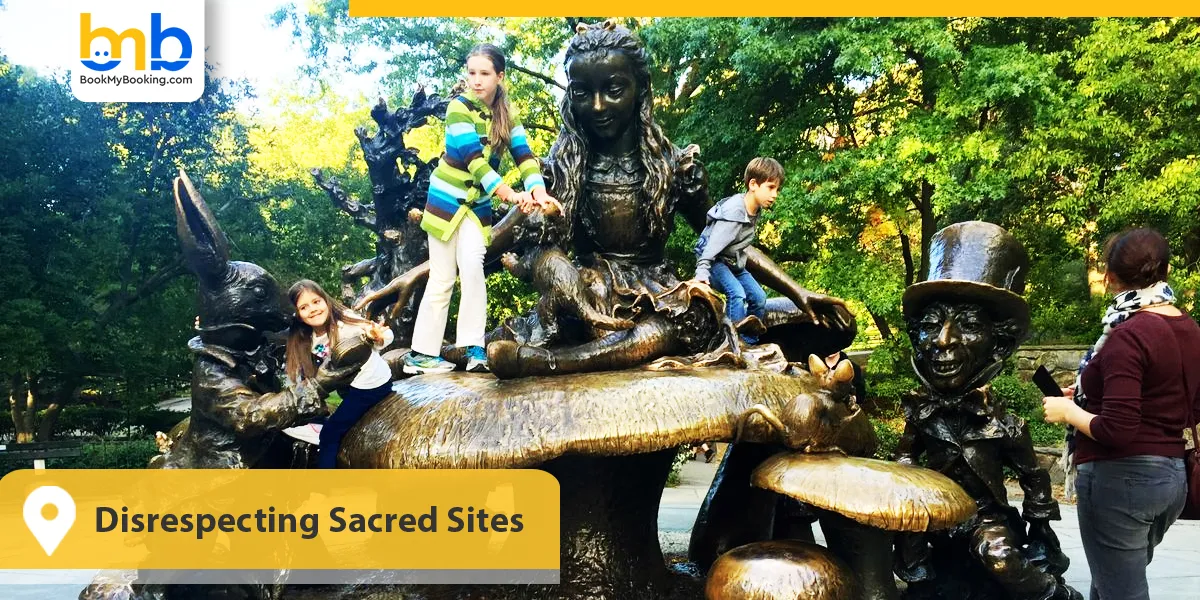
Climbing on monuments, sitting on altars, or posing insensitively in holy spaces makes you part of the unfortunate group practising common travel mistakes. Each culture has spiritual boundaries. These places belong in sacred memory and not your vacation scrapbook. Read signs and follow markers. When guards or monks indicate no touching, listen without arguing. It's not personal; it's about protecting heritage and human dignity. Even seemingly harmless acts like leaning against an ancient carving can erode history. Beyond structural preservation, emotional impact on worshipers should be considered. Your respect shows you value more than Instagram likes. Instead, stroll, take quiet photos from a safe distance, and say a silent hello or blessing in the local form. This is the core of international travel tips, honouring that your presence is a treat, not a right. A small step of reverence protects cultural legacy and keeps you out of trouble.
8. Not Respecting Queue Culture
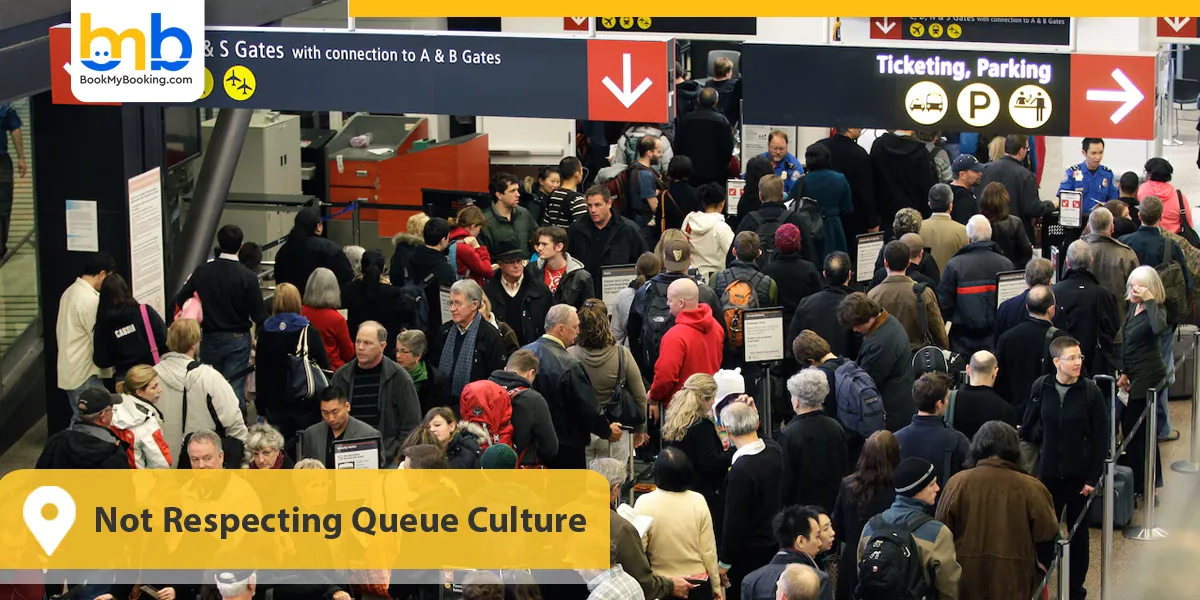
Line-skipping is rude and a universal travel faux pas worldwide. In many places, lines are culturally sacrosanct, preference is based on order, not influence. You don't need to assert your urgency loudly. Instead, locate the end of the queue, join it, and quietly wait your turn. Need clarification? Ask, "Where does the line start?" People will appreciate your manners. The UK, Germany, and Japan are places where queues are nearly ritual. Even in less orderly systems, slipping ahead breeds resentment. Avoid confrontations by simply respecting structure. It signals you understand and appreciate local norms. If you see someone struggling with language or ticket machines, step up to help. Not only will you save face, you'll also stand out as a respectful traveller. In travel, the shared humanity of the queue. Wait your turn, and you'll earn nods of respect.
9. Overindulging in Alcohol and Partying

Travel is fun, but let it stay that way. Public intoxication in foreign lands, especially conservative ones, is massively bad tourist behaviour. In nations like the UAE, Muslim-majority areas, or even quiet European towns, loud, belligerent behaviour can lead to fines or deportation. Seek out local bars or licensed venues to enjoy a drink. Avoid hostel binge culture spilling into sacred or residential zones. Please keep track of locals' behaviour around alcohol: they may drink quietly at dinner, not on the street. If you are in doubt, follow these guidelines. Partying in moderation demonstrates self-awareness and helps protect against reckless travel mistakes. A midlife photo in front of a mosque is one thing, a blackout in public is another. Your international travel experience stays richer and smoother when you respect unspoken rules about celebration and sobriety.
10. Expecting Places to Cater to Your Needs
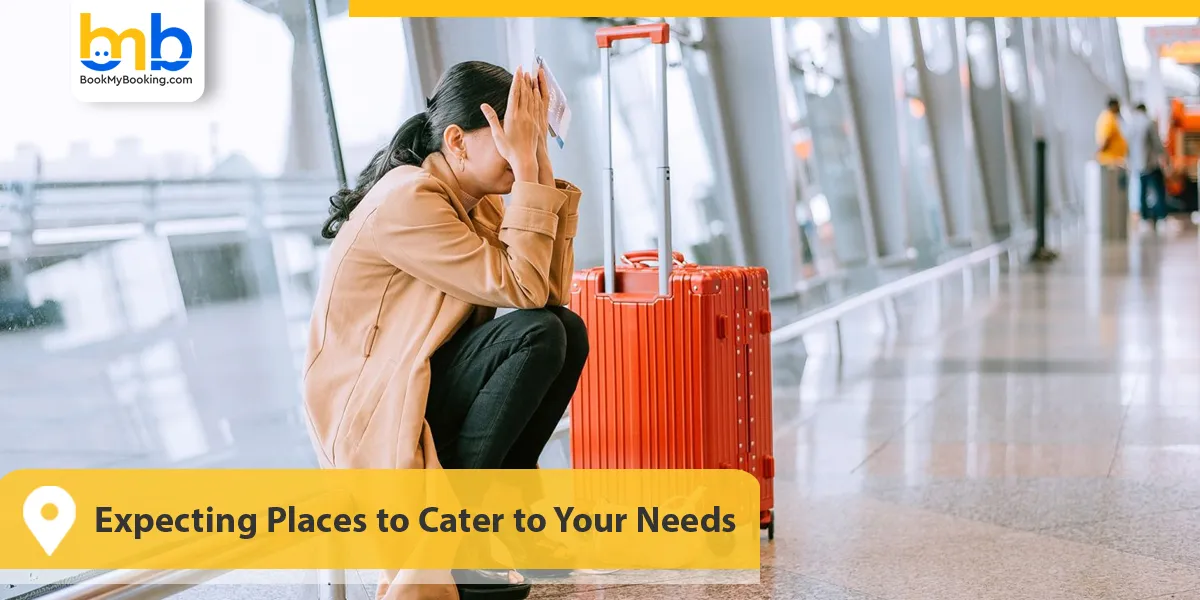
You're not back home, and that's the joy of venturing out. Complaining about food, bathrooms, or Wi-Fi as if the world owes you convenience is a top thing to avoid while travelling. Instead, embrace the detours and surprises: try local street food before seeking a familiar chain. Accept that payment systems differ. Savour the novelty of squat toilets or coins instead of cards. Travellers who adapt instead of demanding reveal the heart of travel etiquette. When service is slower, try to wait with grace instead of impatience. You'll meet more smiling staff and warm locals this way. The moment you stop expecting home comforts is when travel becomes real. It's less about what you want and more about what you learn. That shift makes every day richer and every look you get from a generous local is worth it.
11. Disrespecting Wildlife and Nature

Touching wildlife, littering, or wandering off marked trails are all common travel mistakes that harm ecosystems and communities. Wildlife sanctuaries are not playgrounds, they're fragile spaces. A selfie with a wild animal? That could stress it or put it in peril. Avoid feeding local fauna. Human food disrupts their digestion and behaviours. Respect park rules: stay on trails, keep noise low. Pick up your trash, carry a bag, and plan your cleanup if there's no bin nearby. Let your footprint be light. Tour operators offering "close encounters" should be red-flagged: if it disrupts animals, skip it. This is the core territory of international travel tips for preserving nature's unspoiled beauty. Local guides and conservationists will notice. You'll leave with respect, not regrets.
12. Bargaining Too Harshly
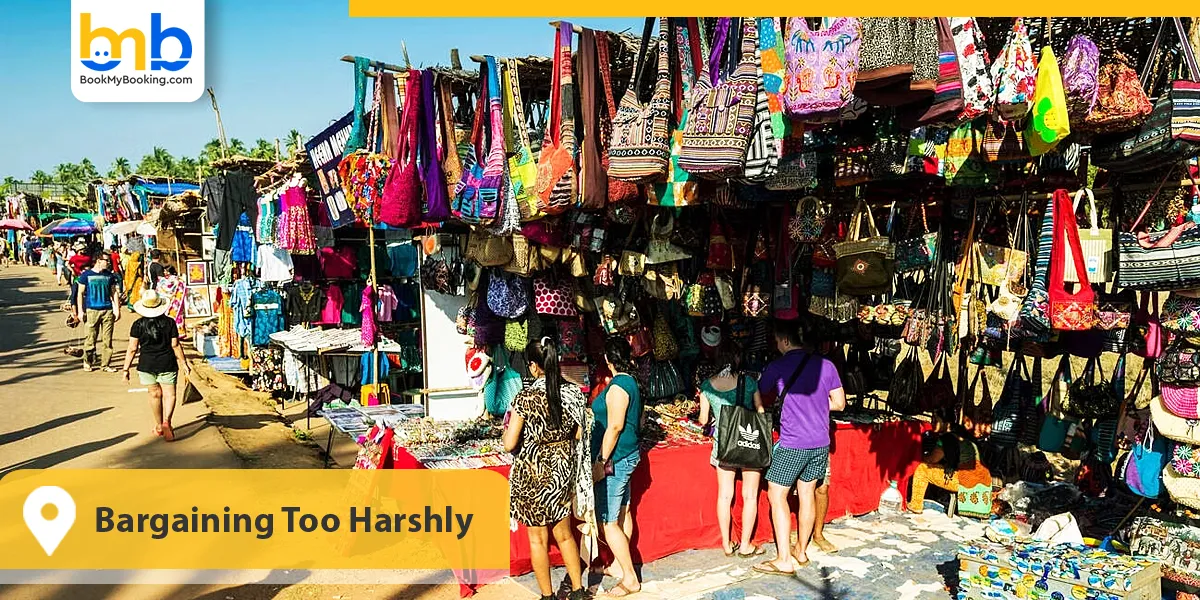
Haggling can be fun, but it's also one of those travel faux pas around the world when done aggressively. Markets in Thailand, Morocco, or India encourage bargaining, but there's a line between playful and predatory. Start with friendly banter and a respectful offer. Don't insult the vendor or snap your fingers. If the price isn't right, walk away politely. You'll often be called back. Pushing a deal down to negligible profits? That hurts their livelihood and stains your reputation. Remember that there's dignity on both sides. Your negotiating power is a privilege. This counts as proper etiquette rules for travellers: you're not winning by crushing someone's income, but by striking fair deals and friendly conversation. Leave feeling good—and leave them smiling too.
13. Sharing Negative Stereotypes

Cringe: travellers generalising entire nations based on their few interactions; another deep travel mistake. Criticising entire cultures for minor mishaps? That's disrespectful and unfair. "All Italians are rude drivers"—really? Instead, note context: maybe they drive fast because they're late to work. Context matters. Use language that separates behaviour from identity: "The traffic was chaotic today," not "All locals are chaotic." Your words carry weight, especially online or in shared reviews. This shift improves your awareness and uplifts global communities. It's the essence of how to be a respectful traveller: choosing curiosity over judgment. You'll make friends instead of enemies, and leave better than you came.
14. Not Learning a Bit About the Culture

Showing up ignorant locks you out from being a meaningful visitor—one of the biggest travel faux pas around the world. Before visiting, read stories about the place: its history, social norms, maybe even a brief timeline of key events. Know if tipping is customary. Discover festivals, cultural taboos, and polite phrases. This prep helps prevent accidental disrespect. It also transforms your trip: you'll understand their stories instead of walking by statues. Instead of ordering unthinkingly, you'll sample signature dishes mindfully. Suddenly, you're not just a tourist but an informed traveller. It's the foundation of etiquette rules for travellers and respectful travel tips. You walk past a ceremony knowing its significance. You can ask intelligent questions. And locals notice effort—earning you more invitations to learn.
15. Failing to Reflect and Share Responsibly
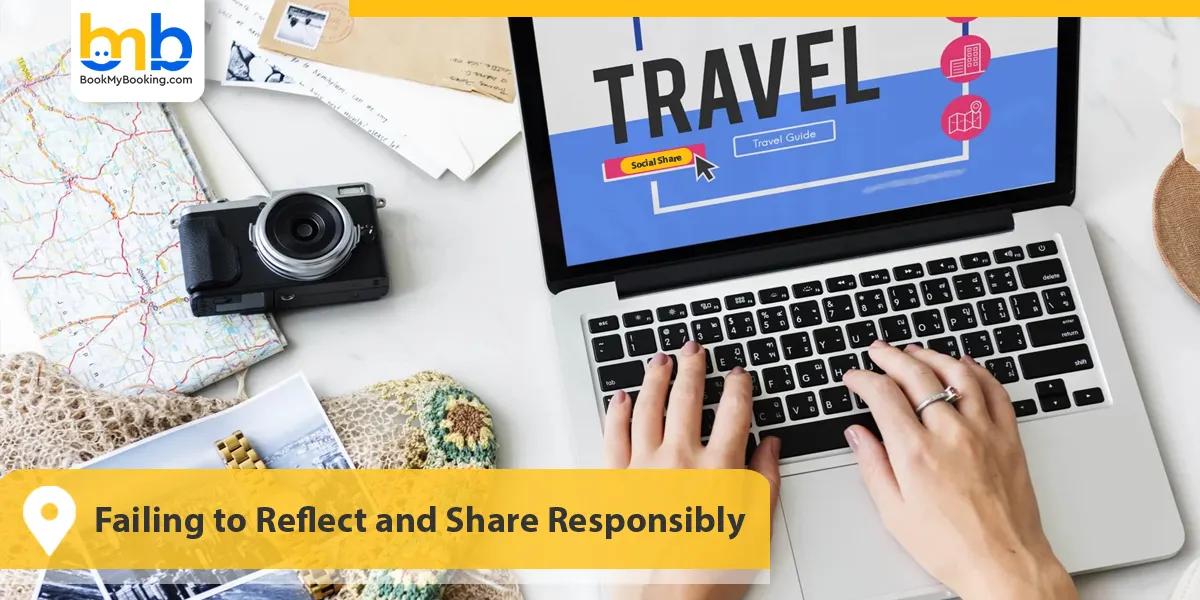
Your travel reflections matter. So, don't use them to amplify bad tourist behaviour or cultural norms travellers often ignore. Posting insensitive comments, cringeworthy photos, or a mocking tone is a missed opportunity. Instead, share thoughtfully: highlight kindness received, lessons learned, cultural insights—not just selfies. Add context to stories. Educate your followers about etiquette norms in a way that encourages curiosity, rather than mockery. If you experienced a rude taxi ride, reflect on the different driving habits of locals instead of generalising. This kind of sharing shows proper travel etiquette, making you not just a traveller, but an ambassador. You shape others' expectations and behaviour. When you do right, your reflections inspire respectful journeys, not disrespectful stereotypes.
Destination-Based Travel Etiquette: Know Before You Go
While general travel etiquette is essential, understanding region-specific customs can make or break your trip. From temple rules in Asia to table manners in Europe, each destination has its code of conduct. Here's a closer look at ten key regions — and what to watch out for.
Japan Travel Etiquette Mistakes to Avoid
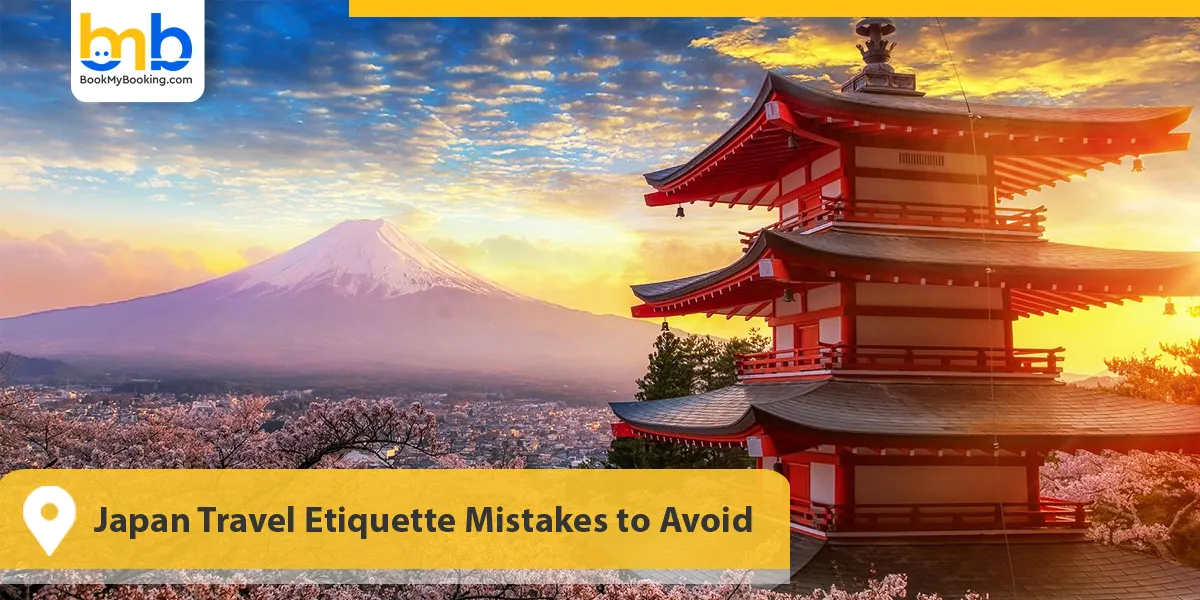
Japan values subtlety, order, and courtesy. Japan travel etiquette mistakes include talking loudly on public transport, not removing shoes in homes or temples, and blowing your nose in public. Don't tip as it's seen as strange or even rude. Bowing is the standard greeting; silence is often preferred in shared spaces. Follow the locals' lead and experience a deeper cultural connection.
Europe Travel Dos and Don'ts

Europe is diverse, but there are some common threads. Among the top Europe travel dos and don'ts: always greet shopkeepers when you enter, don't rush through meals, and be mindful of noise levels. Avoid being overly casual in places like churches or historical landmarks. In many countries, punctuality and personal space are highly valued, unlike in other parts of the world. You should dress neatly, speak politely, and avoid acting entitled, and it makes a difference.
Cultural Taboos in Thailand

The country is known for its kindness, but there are several cultural taboos in Thailand. Never touch someone's head, point your feet at people or religious objects, and always remove your shoes before entering homes and temples. The royal family is held in the highest regard, and any unintentional disrespect is taken seriously. Show respect through body language and modesty; you'll be warmly welcomed.
Things Not to Do in Dubai as a Tourist

While Dubai is ultra-modern, Islamic traditions are a part of daily life. Things not to do in Dubai as a tourist include wearing revealing clothing in public areas, public displays of affection, and drinking alcohol in unauthorised spaces. Eating or drinking in public during Ramadan during daylight hours is considered disrespectful. Always research cultural laws before visiting. Knowing these travel do's and don'ts ensures a smooth, respectful stay.
Travel Etiquette in Latin America

Travel etiquette in Latin America varies by country, but warm greetings and physical contact (such as a kiss on the cheek) are generally considered standard. Don't confuse friendliness with formality; punctuality is relaxed in social settings, but it's essential in business. In some regions, addressing someone by their first name too soon can be perceived as disrespectful. You should be open and friendly, but also observant of cues, as it's all about striking a balance.
What Not to Do in India as a Tourist

India is vibrant, spiritual, and layered with tradition. Among the key things not to do while travelling in India: don't wear shoes inside homes, temples, or mosques; avoid public displays of affection; and don't touch people with your feet. Using your left hand to eat or give items is also frowned upon in many regions. Dress modestly, ask before photographing people (especially women), and respect personal beliefs. These respectful travel tips will help you connect meaningfully with locals.
Etiquette Insights for South Korea

South Korea places a high value on politeness and age hierarchy. It's rude not to bow slightly when greeting elders or to pour your drink at a group meal. Avoid pointing with your chopsticks or sticking them upright in rice, as this is associated with funeral rituals. Respect, order, and tradition guide daily life, making awareness of cultural etiquette for travellers essential here.
Cultural Etiquette in the United States

While often considered relaxed, the U.S. has its own unspoken rules. Tipping is not optional — 15–20% is the standard tip in most service situations. Standing too close in conversation, cutting in line, or being overly inquisitive about sensitive topics such as race, politics, or income can be intrusive. Remember, being casual doesn't mean being careless. Following basic international travel tips can help you blend in and avoid any awkward situations.
Important Customs in Morocco

In Morocco, hospitality is sacred, but modesty and tradition are equally important. Don't enter a mosque unless invited; always ask before taking photos, especially of women. Accepting tea when offered is a polite gesture, even if it's just a sip, and using your right hand is considered essential during meals. Morocco offers rich cultural depth, and understanding local values will deepen your appreciation.
Travel Manners in Australia

Australia is casual and laid-back, but that doesn't mean etiquette doesn't matter. Don't litter, always say "please" and "thank you," and refrain from assuming everyone wants to discuss Aboriginal culture or politics. Tipping is appreciated but not mandatory. Respect for nature and Indigenous land is taken seriously, especially in rural or sacred areas. This is one of those places where 'relaxed' doesn't mean 'rude,' a key point in global travel etiquette.
Conclusion
Travel is a privilege with the power to uplift or unintentionally offend. Every culture you enter offers you a hinge of its heritage, and how you respond defines the legacy you leave behind.
Hence, you must understand travel etiquette, honour local customs, and avoid bad tourist behaviour to be a more respectful, responsible traveller. The more aware you are of your surroundings, the deeper your experiences become. You're no longer just a visitor; you're a guest who has been entrusted with something valuable.
Each gesture of respect, each cultural norm you follow, and each mistake you avoid adds up to a travel story worth remembering, not just for you, but for the people you meet along the way. Choose to be the traveller who connects, learns, and honours, but the kind the world welcomes back with open arms.
 Indian Rupee
Indian Rupee Pound Sterling
Pound Sterling UAE Dirham
UAE Dirham US Dollar
US Dollar Afghanis
Afghanis Algerian Dinar
Algerian Dinar Angolan Kwanza
Angolan Kwanza Argentine Pesos
Argentine Pesos Armenian Dram
Armenian Dram Aruban Florin
Aruban Florin Australian Dollar
Australian Dollar Azerbaijani Manat
Azerbaijani Manat Bahamian Dollars
Bahamian Dollars Bahraini Dinar
Bahraini Dinar Baht
Baht Balboa
Balboa Bangladeshi Taka
Bangladeshi Taka Barbados Dollars
Barbados Dollars Belarusian Rubles
Belarusian Rubles Belize Dollars
Belize Dollars Bermuda Dollars
Bermuda Dollars Bhutanese Ngultrum
Bhutanese Ngultrum Bolivares Fuertes
Bolivares Fuertes Bolivianos
Bolivianos Brazilian Reais
Brazilian Reais Brunei Dollars
Brunei Dollars Bulgarian Leva
Bulgarian Leva Burundian Franc
Burundian Franc Cambodian Riels
Cambodian Riels Canadian Dollar
Canadian Dollar Cape Verdean Escudo
Cape Verdean Escudo Cayman Islands Dollars
Cayman Islands Dollars Central African CFA franc
Central African CFA franc CFP Franc
CFP Franc Chilean Pesos
Chilean Pesos Colombian Pesos
Colombian Pesos Colón
Colón Colones
Colones Comorian Franc
Comorian Franc Congolese Franc
Congolese Franc Convertible Marka
Convertible Marka Cordobas
Cordobas Cuban Pesos
Cuban Pesos Danish Krone
Danish Krone Denars
Denars Dinars
Dinars Djiboutian Franc
Djiboutian Franc Dominican Pesos
Dominican Pesos Dong
Dong East Caribbean Dollars
East Caribbean Dollars Egyptian Pounds
Egyptian Pounds Eritrean Nakfa
Eritrean Nakfa Ethiopian Birr
Ethiopian Birr Euro
Euro Falkland Islands Pounds
Falkland Islands Pounds Fijian Dollars
Fijian Dollars Forint
Forint Gambian Dalasi
Gambian Dalasi Georgian Lari
Georgian Lari Ghanaian Cedi
Ghanaian Cedi Gibraltar Pounds
Gibraltar Pounds Guarani
Guarani Guinean Franc
Guinean Franc Guyanese Dollars
Guyanese Dollars Haitian Gourde
Haitian Gourde Hong Kong Dollars
Hong Kong Dollars Hryvnia
Hryvnia Icelandic Krona
Icelandic Krona Indonesian Rupiahs
Indonesian Rupiahs Iranian Rials
Iranian Rials Iraqi Dinar
Iraqi Dinar Jamaican Dollars
Jamaican Dollars Jordanian Dinar
Jordanian Dinar Kenyan Shilling
Kenyan Shilling Kips
Kips Koruny
Koruny Krone
Krone Kuna
Kuna Kuwaiti Dinar
Kuwaiti Dinar Lati
Lati Lebanese Pounds
Lebanese Pounds Leke
Leke Lempiras
Lempiras Lesotho Loti
Lesotho Loti Liberian Dollars
Liberian Dollars Libyan Dinar
Libyan Dinar Lira
Lira Litai
Litai Macanese Pataca
Macanese Pataca Malagasy Ariary
Malagasy Ariary Malawian Kwacha
Malawian Kwacha Malaysian Ringgit
Malaysian Ringgit Maldivian Rufiyaa
Maldivian Rufiyaa Mauritanian Ouguiya
Mauritanian Ouguiya Mauritian Rupee
Mauritian Rupee Meticais
Meticais Mexican Pesos
Mexican Pesos Moldovan Leu
Moldovan Leu Moroccan Dirham
Moroccan Dirham Myanmar Kyat
Myanmar Kyat Nairas
Nairas Namibian Dollars
Namibian Dollars Nepali Rupee
Nepali Rupee Netherlands Antillean Guilder
Netherlands Antillean Guilder New Dollars
New Dollars New Lei
New Lei New Shekels
New Shekels New Zealand Dollars
New Zealand Dollars North Korean Won
North Korean Won Nuevos Soles
Nuevos Soles Omani Rial
Omani Rial Pakistani Rupees
Pakistani Rupees Papua New Guinean Kina
Papua New Guinean Kina Philippine peso
Philippine peso Pula
Pula Qatari Rials
Qatari Rials Quetzales
Quetzales Rand
Rand Russian Rubles
Russian Rubles Rwandan Franc
Rwandan Franc Samoan Tala
Samoan Tala Sao Tomean Dobras
Sao Tomean Dobras Saudi Riyals
Saudi Riyals Seychellois Rupees
Seychellois Rupees Shillings
Shillings Sierra Leonean Leone
Sierra Leonean Leone Singapore Dollars
Singapore Dollars Solomon Islands Dollars
Solomon Islands Dollars Soms
Soms South Korean Won
South Korean Won Sri Lankan Rupees
Sri Lankan Rupees St. Helena Pounds
St. Helena Pounds Sudanese pound
Sudanese pound Sums
Sums Suriname Dollars
Suriname Dollars Swazi Lilangeni
Swazi Lilangeni Swedish Krona
Swedish Krona Switzerland Francs
Switzerland Francs Syrian Pounds
Syrian Pounds Tajikistani Somoni
Tajikistani Somoni Tanzanian Shilling
Tanzanian Shilling Tenge
Tenge Tongan Paanga
Tongan Paanga Trinidad & Tobago Dollars
Trinidad & Tobago Dollars Tugriks
Tugriks Tunisian Dinar
Tunisian Dinar Turkmenistani Manat
Turkmenistani Manat Ugandan Shilling
Ugandan Shilling Uruguayo Pesos
Uruguayo Pesos Vanuatu Vatu
Vanuatu Vatu West African CFA franc
West African CFA franc Yemeni Rials
Yemeni Rials Yen
Yen Zambian Kwacha
Zambian Kwacha Zlotych
Zlotych

